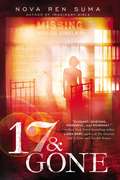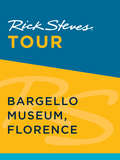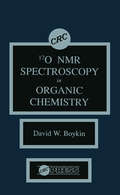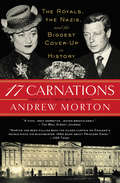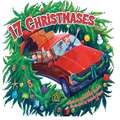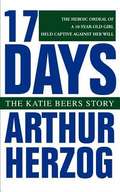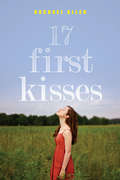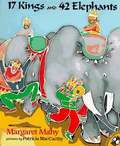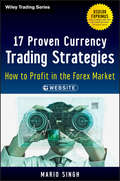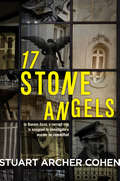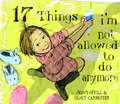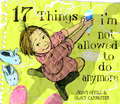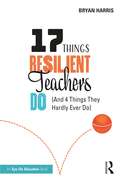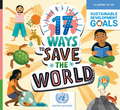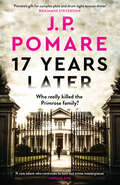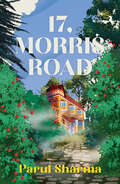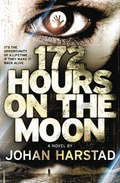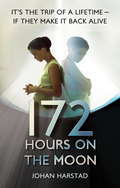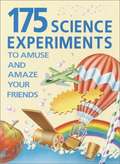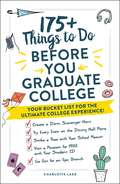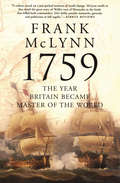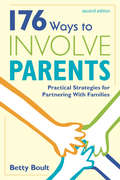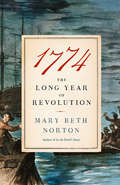- Table View
- List View
17 & Gone
by Nova Ren SumaSeventeen-year-old Lauren is having visions of girls who have gone missing. And all these girls have just one thing in common--they are 17 and gone without a trace. As Lauren struggles to shake these visions, impossible questions demand urgent answers: Why are the girls speaking to Lauren? How can she help them? And . . . is she next? Through Lauren's search for clues, things begin to unravel, and when a brush with death lands Lauren in the hospital, a shocking truth changes everything. With complexity and richness, Nova Ren Suma serves up a beautifully visual, fresh interpretation of what it means to be lost.
17 (Rick Steves Tour Ser.)
by Rick Steves Gene OpenshawRick Steves' Pocket guidebooks truly are a "tour guide in your pocket.” Each colorful compact 280-page book includes Rick's advice for prioritizing your time, whether you're spending 1 or 7 days in a city. Everything a busy traveler needs is easy to access: a neighborhood overview, city walks and tours, sights, handy food and accommodations charts, an appendix packed with information on trip planning and practicalities, and a fold-out city map.Rick Steves' Pocket Florence includes the following walks and tours: Renaissance Walk Accademia Tour: Michelangelo's David Uffizi Gallery Tour Bargello Tour Duomo Museum Tour
17 0 NMR Spectroscopy in Organic Chemistry
by David W. BoykinThis book provides a comprehensive review of the application of 17O NMR spectroscopy to organic chemistry. Topics include the theoretical aspects of chemical shift, quadrupolar and J coupling; 17O enrichment; the effect of steric interactions on 17O chemical shifts of functional groups in flexible and rigid systems; the application of 17O NMR spectroscopy to hydrogen bonding investigations; mechanistic problems in organic and bioorganic chemistry; and 17O NMR spectroscopy of oxygen monocoordinated to carbon in alcohols, ethers, and derivatives. Recent results that show correlations between molecular geometry, determined by X-ray studies and estimated by molecular mechanics calculations, and 17O chemical shifts are also covered. 17O Spectroscopy in Organic Chemistry provides important reference information for organic chemists and other scientists interested in 17O NMR spectroscopy as a tool for obtaining new structural and chemical data about organic molecules.
17 Carnations: The Royals, the Nazis, and the Biggest Cover-Up in History
by Andrew MortonA meticulously researched historical tour de force about the secret ties among Franklin D. Roosevelt, Winston Churchill, the Duke of Windsor, and Adolf Hitler before, during, and after World War II.Andrew Morton tells the story of the feckless Edward VIII, later Duke of Windsor, his American wife, Wallis Simpson, the bizarre wartime Nazi plot to make him a puppet king after the invasion of Britain, and the attempted cover-up by Churchill, General Eisenhower, and King George VI of the duke's relations with Hitler. From the alleged affair between Simpson and the German foreign minister to the discovery of top secret correspondence about the man dubbed "the traitor king" and the Nazi high command, this is a saga of intrigue, betrayal, and deception suffused with a heady aroma of sex and suspicion.For the first time, Morton reveals the full story behind the cover-up of those damning letters and diagrams: the daring heist ordered by King George VI, the smooth duplicity of a Soviet spy as well as the bitter rows and recriminations among the British and American diplomats, politicians, and academics. Drawing on FBI documents, exclusive pictures, and material from the German, Russian, and British royal archives, as well as the personal correspondence of Churchill, Eisenhower, and the Windsors themselves, 17 CARNATIONS is a dazzling historical drama, full of adventure, intrigue, and startling revelations, written by a master of the genre.
17 Christmases
by Dandi Daley MackallI thank God for Jesus and family galore, For seventeen Christmases—never a chore. Christmas is full of adventure when the family decides to go on a holiday road trip. They start in California and travel to North Carolina and then to Colorado. And that’s only the beginning! New sights and ways to celebrate the birth of Jesus abound. All this plus the special visits with family and friends turn the holidays into seventeen wonderful Christmases.
17 Days: The Katie Beers Story
by Arthur HerzogOn December 28, 1992, two days before her tenth birthday, Katie Beers disappeared. She had left for an outing with a close family friend, John Esposito, and her whereabouts remained mysterious as the year drew to a close and her family grew frantic, fearing the worst. On January 13th, Katie was found alive in a secret, dungeon-like vault beneath Esposito's Bay Shore, Long Island house. Families nationwide followed the story of Katie's heart-wrenching ordeal, as she bravely survived the isolation until her nearly miraculous rescue from a setting reminiscent of "The Silence of The Lambs." Katie's harrowing story reveals a chilling side of human nature, even in the seemingly peaceful suburbs. And her fate as the smiling survivor of a troubled family raises disturbing questions about the plight of children across America: children like Katie, whose trust can be so easily betrayed.
17 First Kisses
by Rachael AllenIn this incandescent page-turner, sixteen-year-old Claire learns the unfortunate truth that sometimes a girl has to kiss a lot of frogs. . . . Brilliantly capturing the complexities of friendship, the struggles of self-discovery, and the difficulties of trying to find love in high school, Rachael Allen has crafted a rich debut that's impossible to put down.No matter how many boys Claire kisses, she can't seem to find a decent boyfriend--someone who isn't afraid of her family's tragic past or her own aspirations for the future . . . until she meets Luke. But Megan, Claire's closest friend, is falling for Luke, too, and if there's one thing Claire knows for sure, it's that Megan is pretty much irresistible. With true love and best friendship on the line, Claire suddenly has everything to lose. And what she learns--about her crush, her friends, and most of all herself--makes the choices even harder.
17 Kings and 42 Elephants
by Margaret MahyWhere those kings are headed is a mystery, but no travelers ever had such a jolly time. Here is a royal romp through a tongue-twisting paradise.
17 Proven Currency Trading Strategies
by Mario SinghCountless money-making opportunities abound in the Foreign Exchange (Forex) market every day, but how does an amateur investor take advantage of these opportunities to earn high returns? This book by CNBC-featured Forex Expert Mario Singh provides a comprehensive solution to this question.Following the first section that explains in plain English--what is Forex trading, how money is made in the Forex "game," the six major players involved, and the importance of knowing one's Trader Profile--the second section focuses on specific and practical guidance which includes:A "Trader Profile Test" to help the reader get a clear picture of his natural trading style and which of five trading profiles he belongs to (Scalper, Day Trader, Swing Trader, Position Trader or Mechanical Trader)17 proven trading strategies (between 2 to 5 strategies for each trader profile) for the reader to immediately start cashing in on the Forex marketDescriptions of an array of real-world trading scenarios, with tips on how to address themA section that shows the reader how to custom-tailor a trading system designed for his sensibilities and risk toleranceForex hedging strategies for finance professionals at multinational corporationsShort on theory and long on practical insights and step-by-step guidance, 17 Proven Currency Trading Strategies--How To Profit in the Forex Market will help anyone--from beginners to professionals, and everyone in between--to master the Forex market and be consistently profitable.
17 Stone Angels
by Stuart Archer CohenIn Buenos Aires, a corrupt cop is assigned to investigate a murder he committedCommissioner Miguel Fortunato is nearing retirement after a long, dishonest career. Six months ago he was ordered to kidnap foreigner Robert Waterbury for reasons left unclear. The kidnapping turned to murder. Now the Americans are sending their own investigator, and Fortunato is assigned to support her.Fortunato is quickly drawn into the dazzling world of his victim, a failed novelist who came to Buenos Aires desparate to make a big score. As he uncovers the vast outlines of a global crime, Fortunato begins to unravel not only the murder, but the deeper mystery of his own career and the lies that have sustained it.
17 Things I'm Not Allowed To Do Anymore
by Jenny OffillI had an idea to glue my brother's bunny slippers to the floor. I am not allowed to use the glue anymore. Meet a kid who's full of ideas. Great ideas. Brilliant ideas. It's just too bad grown-ups don't seem to understand her genius. . . .
17 Things I'm Not Allowed to Do Anymore
by Jenny OffillI had an idea to staple my brother's hair to his pillow. I am not allowed to use the stapler anymore. Here's a kid full of ideas, all day long. For example, in the morning, gluing her brother's bunny slippers to the floor sounds like a good plan. But now she's not allowed to use glue anymore. And what about when she shows Joey Whipple her underpants--they're only underpants, right? Turns out she's not allowed to do that again, either. And isn't broccoli the perfect gift for any brother? It's just too bad her parents don't think so. But she has the last laugh in this humerous first picture book by an acclaimed novelist of books for adults. From the Hardcover edition.
17 Things Resilient Teachers Do: (And 4 Things They Hardly Ever Do)
by Bryan HarrisThis book will help you learn practical ways to manage the stress of teaching and avoid burnout. Bestselling author and educational consultant Bryan Harris presents strategies for building resilience, including reframing, understanding the power of "no", focusing on what you can control, building positive relationships, advocating for yourself, and more. Each chapter clearly presents concise and practical applications that you can implement right away. With this guidebook, you’ll feel ready to bounce back from challenges and stay focused on the joys of the profession.
17 Ways to Save the World
by Louise SpilsburyHelp the United Nations to save the world! On 25 September 2015, world leaders at the UN adopted 17 Sustainable Development Goals. These new Goals, which universally apply to all people, are a call to take action to end all forms of poverty, fight inequalities and tackle climate change, while ensuring no one is left behind. For the Goals to be reached, it is not just the actions of governments and businesses that are important - you can help the UN save the world, too! Produced in support of the United Nations, 17 Ways to Save the World is an accessible guide to how you can help the UN achieve their 17 Sustainable Development Goals. As well as charting the global issues identified in the Goals, this book will demonstrate how small lifestyle changes can help in solving the world's biggest issues, empowering you to actively pursue a more sustainable future. This book is the perfect tool for kids aged 9+ looking to make a meaningful difference. Immersive artwork and sensitive text presents serious, worldwide problems in an compassionate manner, encouraging both empathy and action.
17 Years Later: A shocking crime thriller
by J.P. Pomare'Pomare's gift for complex plots and drum-tight tension shines' BENJAMIN STEVENSON'Flawlessly plotted . . . breathless suspense . . . no-one delivers twists or turns quite like J.P. Pomare' ANNA DOWNES'Shocking, twisty and impossible to put down - all the things I've come to expect from one of Australia's most talented and prolific authors' CHRISTIAN WHITEWHO REALLY KILLED THE PRIMROSE FAMILY? The violent slaughter of the Primrose family while they slept shocked the nation.The family's young live-in chef, Bill Kareama, was swiftly charged with murder and brought to justice. But the brutal crime scarred the idyllic town of Cambridge forever. Seventeen years later, true-crime podcaster Sloane Abbott tracks down prison psychologist TK Phillips. Once a fierce campaigner for an appeal, TK now lives a quiet life with Bill's case firmly in his past. As Sloane lures a reluctant TK back into the fight, evidence emerges that casts new light on the Primroses - and who might have wanted them dead.While the list of suspects grows, Bill's innocence is still far from assured. What will it cost Sloane and TK to uncover the truth?Praise for internationally bestselling author J. P. Pomare's thrillers including The Wrong Woman:'A rare talent who continues to turn out crime masterpieces' Herald Sun'This grabbed me from the opening page and didn't let go' MICHAEL ROBOTHAM'Edge-of-your-seat stuff. Deftly plotted, pacy, sharply written' New Zealand Women's Weekly'A twisty small-town mystery with a protagonist I didn't want to let go' IAN RANKIN'The thrill and fear arrive early and don't leave until the final pages' CANDICE FOX
17, Morris Road
by Parul SharmaSometimes, home is a place between longings for the past and the allure of the future...Soon-to-be empty-nester Gayatri Trivedi has found herself at a crossroads: her only son is off to the land of excessive pizza and cola, her husband remains indifferent to her feelings, and the object of her teenage affection is inviting her to Dehradun. But Dehradun has changed a lot, and so has Arbour House, the colonial-era bungalow that still has a piece of her heart. Now as she returns, she also returns in time, reminiscing about the memories she made with people who changed her life when she was sixteen.As the cloud of nostalgia clears and her future comes into view, Gayatri must decide if she's ready to let go of what-ifs. Equal parts charming and delightful 17, Morris Road weaves together a heartfelt story of times past and emotions buried, and most of all, of eventually finding one's place in an ever-changing world.
172 Hours on the Moon
by Johan HarstadIt's been decades since anyone set foot on the moon. Now three ordinary teenagers, the winners of NASA's unprecedented, worldwide lottery, are about to become the first young people in space--and change their lives forever. Mia, from Norway, hopes this will be her punk band's ticket to fame and fortune. Midori believes it's her way out of her restrained life in Japan. Antoine, from France, just wants to get as far away from his ex-girlfriend as possible.It's the opportunity of a lifetime, but little do the teenagers know that something sinister is waiting for them on the desolate surface of the moon. And in the black vacuum of space... no one is coming to save them. In this chilling adventure set in the most brutal landscape known to man, highly acclaimed Norwegian novelist Johan Harstad creates a vivid and frightening world of possibilities we can only hope never come true.
172 Hours on the Moon
by Johan HarstadThree teenagers are going on the trip of a lifetime. Only one is coming back.It's been more than forty years since NASA sent the first men to the moon, and to grab some much-needed funding and attention, they decide to launch an historic international lottery in which three lucky teenagers can win a week-long trip to moon base DARLAH 2-a place that no one but top government officials even knew existed until now. The three winners, Antoine, Midori, and Mia, come from all over the world.But just before the scheduled launch, the teenagers each experience strange, inexplicable events. Little do they know that there was a reason NASA never sent anyone back there until now-a sinister reason. But the countdown has already begun. . .
175 Fresh Card Ideas: Designs to Make and Give Throughout the Year
by Kimber McgrayShare joy with handmade cards! Handmade cards are fun to give and receive! 175 Fresh Card Ideas is packed with ideas for all occasions-from kid-friendly themes and milestone birthdays to holidays, bridal and baby showers and sweet sentiments-so you'll never be stuck without a design idea for any card-giving occasion. More than 50 cards include step-by-step instructions and each chapter features a gallery brimming with more inspiration. You'll discover: Essential techniques for card-making-including rubber stamping, paper trimming, using Copic markers and more-great for beginning card-makers and enthusiasts alike. Ideas for special sentiments that will work interchangeably with many of the cards. Sketches for creating cards and inspiration for tags, gift bags, candy wrappers and more are also included. Let 175 Fresh Card Ideas help you celebrate any occasion!
175 Science Experiments to Amuse and Amaze Your Friends: Experiments, Tricks, Things to Make
by Brenda Walpole"Facts, experiments, tricks based on scientific principles, and things to make comprise the text of this book. The material is divided into four sections--water, air, movement, and light. The language used is clear, concise, and interesting. Every experiment, trick, and object to make is not only explained clearly but illustrated as well, making the book especially useful for the visual learner. There is so much here to intrigue readers! This will surely bring young readers into the interesting world of science." --(starred)Science Books & Films.
175 Years of Persecution: A History of the Babis & Baha'is of Iran
by Fereydun VahmanFor almost two centuries, followers of the Baha&’i faith, Iran&’s largest religious minority, have been persecuted by the state. They have been made scapegoats for the nation&’s ills, branded enemies of Islam and denounced as foreign agents. Since the Islamic Revolution of 1979 Baha&’is have been barred from entering the nation&’s universities, more than two hundred have been executed, and hundreds more imprisoned and tortured. Now, however, Iran is at a turning point. A new generation has begun to question how the Baha&’is have been portrayed by the government and the clergy, and called for them to be given equal rights as fellow citizens. In documenting, for the first time, the plight of this religious community in Iran since its inception, Fereydun Vahman also reveals the greater plight of a nation aspiring to develop a modern identity built on respect for diversity rather than hatred and self-deception.
175+ Things to Do Before You Graduate College: Your Bucket List for the Ultimate College Experience!
by Charlotte LakeMake the most of your college years with these 175+ unique activities for the ultimate college experience.From finding the perfect friend group to succeeding academically to exploring your newfound freedom, there&’s a lot that goes into making your college experience a success. Instead of getting trapped in the myth that you can &“do it all,&” 175+ Things to Do Before You Graduate College will help you figure out what&’s most important to you…and how to make it happen. With this college-themed bucket list, you&’ll find everything you need to do before you graduate. Whether you&’re trying to make sure your four years in college are the best they can be or preparing for next steps post-graduation, you&’ll learn exactly how to set yourself up for success (and fun!) with activities like: -Becoming a TA as an undergrad for a subject you&’re truly passionate about -Heading off-campus with your friends to snag the first fresh donuts of the day -Paying it forward by buying lunch for the person behind you in the dining hall line, even if you don&’t know them -Getting creative and starting up a campus-wide game of hide-and-seek -And much more! It&’s easy: first, check out the 175+ unique and interesting activities you can do to add some fun, excitement, and maybe even a few impressive accomplishments to your life. Then, use the journaling space to create and update your own personal college bucket list. From there, just gather some friends and get started on making sure your college experience is as happy, healthy, and successful as possible!
1759: The Year Britain Became Master of the World
by Frank McLynnIf not for the events of 1759, the entire history of the world would have been different. Called the "Year of Victories," 1759 was the fourth year of the Seven Years, or the French-and-Indian War and defeat of the French paved the way for the global hegemony of the English language. Guiding us through England's conquests (and often extremely narrow victories), Frank McLynn (Wagons West) brilliantly interweaves primary sources, ranging from material in the Vatican archives to oral histories of Native Americans. In a stunning chronicle of a pivotal year in world history, he controversially concludes that the birth of the great British Empire was more a result of luck than of rigorous planning.
176 Ways to Involve Parents: Practical Strategies for Partnering With Families
by Betty L. BoultThis updated edition presents ready-to-use ideas and strategies to fully engage parents in the school community.
1774: The Long Year of Revolution
by Mary Beth NortonFrom one of our most acclaimed and original colonial historians, a Pulitzer Prize finalist, 2018 president of the American Historical Association, a groundbreaking book--the first to look at the critical "long year" of 1774 and the revolutionary change that took place from December 1773 to mid-April 1775, from the Boston Tea Party and the first Continental Congress to the Battles of Lexington and Concord.This masterly work of historical writing, Mary Beth Norton's first in almost a decade, looks at the sixteen months during which the traditional loyalists to King George III began their discordant "discussions" that led to their acceptance of the inevitability of war against the British Empire and to the clashes at Lexington and Concord in mid-April 1775. Drawing extensively on pamphlets, newspapers, and personal correspondence, Norton reconstructs colonial political discourse as it happened, showing the vigorous campaign mounted by conservatives criticizing congressional actions. But by then it was too late. In early 1775, governors throughout the colonies informed colonial officials in London that they were unable to thwart the increasing power of the committees and their allied provincial congresses. Although the Declaration of Independence would not be formally adopted until July 1776, Americans, even before the outbreak of war in April 1775, had in effect "declared independence" by obeying the decrees of their new provincial governments rather than colonial officials.The much-anticipated new book by one of America's most dazzling historians--the culmination of more than four decades of Norton's research and thought.
